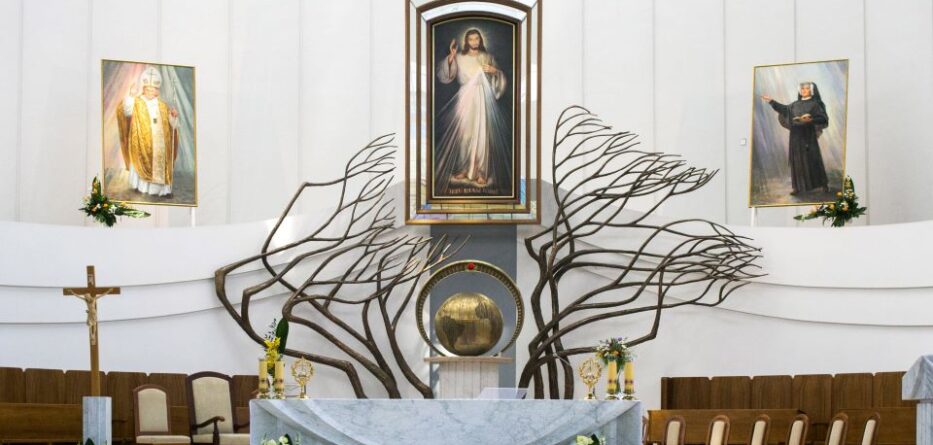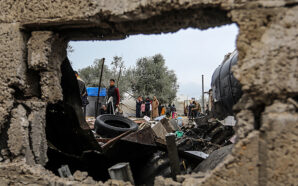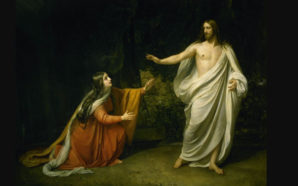Homily for the 2nd Sunday of Easter, Sunday of Divine Mercy
16 April 2023
Acts 2:42-47; Psalm 118; 1 Peter 1:3-9; John 20:19-31
In today’s gospel from John, we are told that the disciples are locked in a room paralysed by fear.[1] Jesus appears and declares: ‘Peace be with you.’ At his last meal with the disciples before his death, Jesus had said, ‘Peace I bequeath to you, my own peace I give to you, a peace which the world cannot give, this is my gift to you. Do not let your hearts be troubled or afraid.’ He concluded: ‘I have told you all this so that you may find peace in me. In the world you will have hardship, but be courageous, I have conquered the world.’
Easter is a time for dreaming dreams and for hoping against hope – that there will be peace. Pragmatists, even if they be religious believers, are unlikely to expend too much energy hoping against hope. But with the state of our troubled world in Ukraine, Syria, Palestine, Yemen, Somalia, and Myanmar, it behoves us to take a breather and contemplate what peace might look like, or how we might get there. Expanding the moral imagination and confirming the spiritual consolation of promised and elusive peace might just assist us – both to do more of the hard work in thinking about how peace might be fostered in our troubled world, and to commit more of our resources to ensuring the preconditions for peace for those cheated it through no fault of their own.
LISTEN: https://soundcloud.com/frank-brennan-6/homily-16423
We are now marking the 20th anniversary of the disastrous Iraq War. There have been many post facto observations about the war. There are still many lessons to learn from such a disastrous military escapade. Some of those lessons were plain for all to see even back then twenty years ago when many of us turned out in tens of thousands to protest the war. Our voices were not heard, or if heard, were not heeded. Pope John Paul II at the time despatched Cardinal Laghi the one time tennis partner of George Bush Snr to meet with President George W Bush. The pope wrote to the US president:
‘I have spared no effort in asking all parties to take every measure to ensure that the precious gift of peace is preserved and protected. I am convinced that peace is always possible even in the most difficult situations.
‘For this reason, I did not hesitate to send my special Envoy to speak with the President of Iraq and to ask his Government to cooperate fully with the United Nations Organization in complete compliance with its international obligations, given the consequences that an armed conflict would have upon his people.
‘I have now decided to send to you Cardinal Pio Laghi, former Apostolic Nuncio to the United States, whom I am sure you know. I ask you to receive him as my personal Envoy and to listen to the message that he bears on my behalf. It represents what lies in the depth of my heart for the good of all people.’[2]
Even some of the most conservative Catholics in the USA disregarded John Paul’s intervention completely. Nationalism and political ideology are often trumps even for the most religious of folk. For his part, John Paul dealt respectfully, firmly and clearly with both sides.
While honouring necessary diplomatic confidences, Laghi at the time issued a public statement saying:
‘[T]he Holy See’s position has been two-fold. First, the Iraqi government is obliged to fulfill completely and fully its international obligations regarding human rights and disarmament under the UN resolutions with respect for international norms. Second, these obligations and their fulfillment must continue to be pursued within the framework of the United Nations.’
Laghi maintained that there were ‘still peaceful avenues within the context of the vast patrimony of international law and institutions which exist for that purpose. A decision regarding the use of military force can only be taken within the framework of the United Nations, but always taking into account the grave consequences of such an armed conflict: the suffering of the people of Iraq and those involved in the military operation, a further instability in the region and a new gulf between Islam and Christianity.’[3]
At least the mistakes have been admitted in the UK; not so, here in Australia. In the UK, they conducted the comprehensive Chilcot Inquiry which found that the decision to go to war was taken before ‘peaceful options for disarmament had been exhausted’. Tony Blair, while still defending his decision to go to war, did admit to making some mistakes and said, ‘I express more sorrow, regret and apology than you can ever know or believe’. Here we saw no need for inquiry, and there’s be no apology of any sort. The day after Tony Blair’s qualified mea culpa, John Howard, asserting ‘There was no lie. There were errors in intelligence but there was no lie’, said: ‘I believed that the decision to go into Iraq was justified at the time and I don’t resile from that because I thought it was the right decision.’
With the Russian invasion of Ukraine, Pope Francis took the unprecedented step of going down the street and entering the Russian embassy to plead for peace with the ambassador. Publicly he appealed ‘to those with political responsibility to examine their consciences seriously before God, who is the God of peace and not of war.’ He encouraged believers to dedicate themselves intensely to prayer and fasting, saying: ‘May the Queen of Peace preserve the world from the madness of war.’
During this Easter Octave, we are invited to open our borders and break out of our isolationist fears. We dream of peace and we recommit ourselves to peace built on a commitment to an international order which treats all warring factions according to their just deserts. We need to admit the errors of past our ways. We should not confuse national self defence with a commitment to an alliance aimed at international dominance. And when confronted with an interminable conflict as in Ukraine, we pray the more earnestly and commit ourselves in solidarity to those who suffer through no fault of their own nor of their leaders, knowing that there is some ‘peace which the world cannot give’.
Pope John Paul II named this day the Sunday of Divine Mercy. In our war-torn world we pray:
Give thanks to the Lord for he is good, his love is everlasting.
Let the house of Israel say,
“His mercy endures forever.”
Let the house of Aaron say,
“His mercy endures forever.”
Let those who fear the Lord say,
“His mercy endures forever.”
Give thanks to the Lord for he is good, his love is everlasting.
[1] I have not quoted the actual verse from the gospel (John 20:19). Our bishops have rightly urged: ‘That Catholic liturgical celebrations avoid negative stereotypes of Jews and Judaism. Liturgy offers worship to God and forms us as a community. It is not the place to offer negative comments or comparisons about our elder brothers and sisters, the Jewish people, or the Pharisees, the forebears of Rabbinic Judaism.’ See https://drive.google.com/file/d/1yRFeH5BDXBje1A8zNqz5ajBKRfyMZS5e/view
[2] Letter of Pope John Paul II to President George W Bush, 3 March 2003, available at https://www.commonwealmagazine.org/sites/default/files/imce/30047/JP2%20to%20Bush-3-3-2003%20%281%29.pdf
[3] Statement by Cardinal Laghi, 5 March 2003, available at https://www.usccb.org/resources/statement-iraq-papal-envoy-after-meeting-president-bush-march-5-2003
Fr Frank Brennan SJ is the Rector of Newman College, Melbourne, and the former CEO of Catholic Social Services Australia (CSSA). He was appointed a peritus at the Fifth Plenary Council of the Australian Catholic Church. Fr Frank’s latest book is An Indigenous Voice to Parliament: Considering a Constitutional Bridge, Garratt Publishing, 2023.








